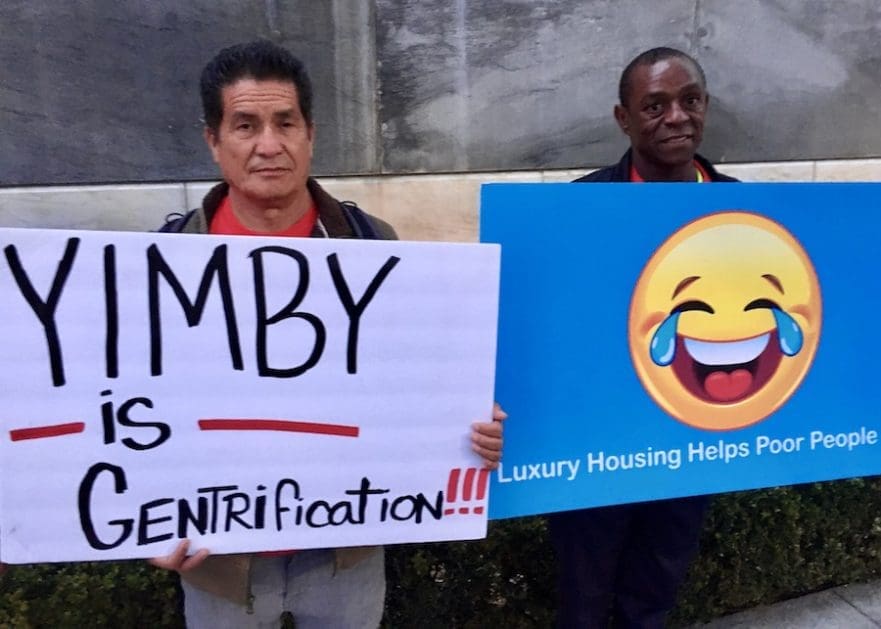Corporate YIMBYs have repeatedly tried to frame themselves as housing justice activists, but that’s far from the truth. In fact, a new book titled Selling Off California: The Untold Story reveals that Corporate YIMBYs have deep ties to Big Real Estate and Big Tech, pushing forward their pro-gentrification, trickle-down housing agendas at the expense of working-class communities, especially those of color. Let’s run through the key findings of the book.
Written by Patrick Range McDonald, Housing Is A Human Right’s award-winning advocacy journalist, Selling Off California first reveals that California YIMBY was founded by tech executives to counter a worsening public backlash for Big Tech’s major role in fueling gentrification and the housing affordability crisis in the Bay Area.
“Faced with increasing ill will and bad public relations,” McDonald writes, “Big Tech understood it needed to act. In a candid 2017 article by The Information, titled ‘Tech Leaders Seeks Bigger Political Role With Housing Push,’ Pantheon CEO Zack Rosen explained that a ‘combination of over-regulation by the state and the tech industry’s success has created the [housing] problem. I feel there’s a real onus on us to lead.’ But with millions of middle- and working-class Californians struggling to pay exorbitant rents, Big Tech’s need to lead was hardly altruistic.”
McDonald continues, “What pushed tech executives into action, Rosen told The Information, was that the housing affordability crisis had become an ‘existential threat’ to the growth of the tech industry. In other words, Big Tech wanted to protect, and expand, its gigantic profits.”
Rosen founded California YIMBY with Microsoft executive Nat Friedman, and brought in YIMBY ringleader Brian Hanlon to run it and organize YIMBY groups up and down California. Selling Off California reports that Rosen and Friedman wanted “California YIMBY to lobby state legislators and draft Big Tech-backed housing and land-use bills. The tech industry also needed ground troops to counter the inevitable ire of housing justice and social justice activists.”
Big Tech executives then shelled out millions to both California YIMBY and its political action committee, California YIMBY Victory Fund, which handed out campaign contributions to state politicians. To advance a land-use deregulation, trickle-down housing agenda, California YIMBY delivered campaign cash to such key politicians as California State Treasurer Fiona Ma, California State Senator Toni Atkins, and California State Senator Scott Wiener.
Housing justice activists were alarmed.
Selling Off California reports that Peter Cohen, co-director of the Council of Community Housing Organization, told The Information: “The losers in this deregulation agenda will be the working-class and lower-income communities of color in these hot markets, which are the major cities in California. The tech industry jumping into the housing situation is a self-interested political calculation.”
The book also reveals what Anya Lawler, a policy advocate with the Western Center on Law & Poverty, told the Los Angeles Times: “The YIMBY movement has a white privilege problem. I don’t think they recognize it. They don’t understand poverty. They don’t understand what that’s like, who our clients really are, and what their lived experience is.”
McDonald writes in Selling Off California: “California YIMBY and other YIMBY groups have increasingly framed their work as a righteous cause that’s bringing the fight to NIMBYs to fix a housing crisis. It’s spin that conveniently marginalizes, even ignores, the housing justice movement and provides excellent political cover to elected officials.”
He further notes that Corporate YIMBYs “were solely concerned about themselves and their need for more new housing, not the plight of lower-income people. In a 2017 article in the Mercury News, a quote by YIMBY Action executive director Laura Clark, a young techie, neatly summed up the YIMBY mindset: ‘Where is my generation going to live?’ (Later, out of political necessity, they’d reframe their public messaging to appear more like housing justice activists.)”
As a result, Corporate YIMBYs constantly butted heads with housing justice activists, especially those of color. Selling Off California provides telling quotes.
“It’s been absolutely ugly,” Bay Area activist Shanti Singh said in 2019, describing her interactions with YIMBYs. “A really nasty three years.”
Maria Zamudio, another Bay Area activist, explained, “They’re like, ‘Just build housing, you stupid brown people! I moved here last week, and I need a place to live!’”
Fernando Marti, co-director of the San Francisco-based Council of Community Housing Organizations, wrote in a Shelterforce column: “But according to the YIMBY leaders, now we equity advocates are the problem, too, little different from NIMBYs, rabid progressive who are too naive or ideological to understand how the market really works. In this story line, in the name of fighting evictions and displacement, we progressive, we communities of color, we poor people and immigrants, we working-class queers stupidly don’t realize that luxury development now will eventually become affordable housing of the future!”
And that’s where Big Real Estate comes in. California YIMBY CEO Brian Hanlon confessed to a reporter that he was “certainly willing to accept money from developers.” In addition, and most importantly, Corporate YIMBYs were becoming the ground troops to actively implement Big Real Estate’s pro-gentrification, trickle-down housing agenda, zealously supporting state legislation that the real estate industry sought to pass.
To further underline Corporate YIMBYs’ ties to Big Real Estate, Selling Off California reveals that California YIMBY refused to endorse Proposition 10 in 2018 and Proposition 21 in 2020. The initiatives sought to expand local rent control policies, and were vigorously embraced by hundreds of social justice and housing justice organizations, labor unions, and elected officials. By staying quiet, Corporate YIMBYs stood with Big Real Estate, which shelled out more than $175 million to kill both ballot measures. Big Tech also kept silent during the Prop 10 and Prop 21 battles.
Housing justice activists suspect that California YIMBY receives funding from Big Real Estate executives. But since California YIMBY is a nonprofit, it doesn’t have to provide the names of its contributors.
McDonald writes: “And the organization seems intent on staying non-transparent – [California YIMBY CEO Brian Hanlon] tries to keep mum on exactly who is giving what and never answered a request from Housing Is A Human Right to name California YIMBY’s top 50 donors.”
Selling Off California is a must-read to learn more about Corporate YIMBYs’ connections to Big Tech and Big Real Estate and their disturbing history of battling housing justice activists in California. Download the book for free.

